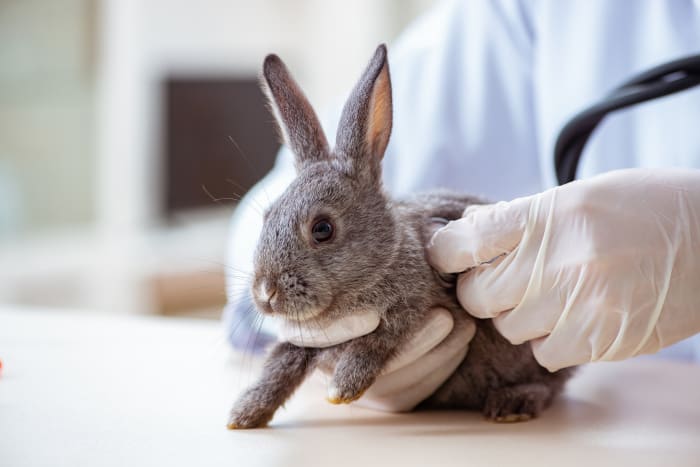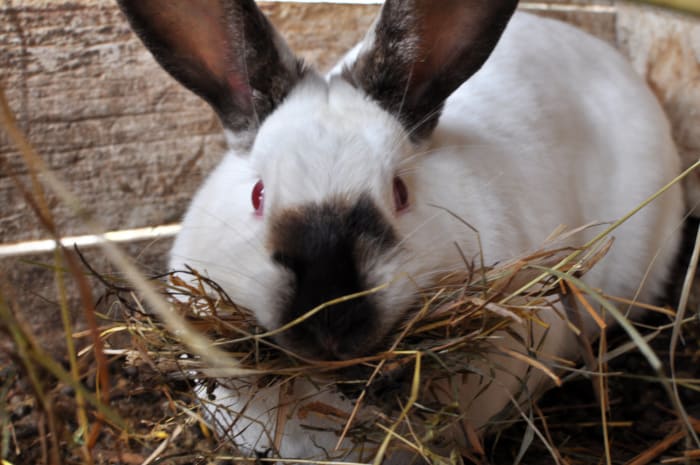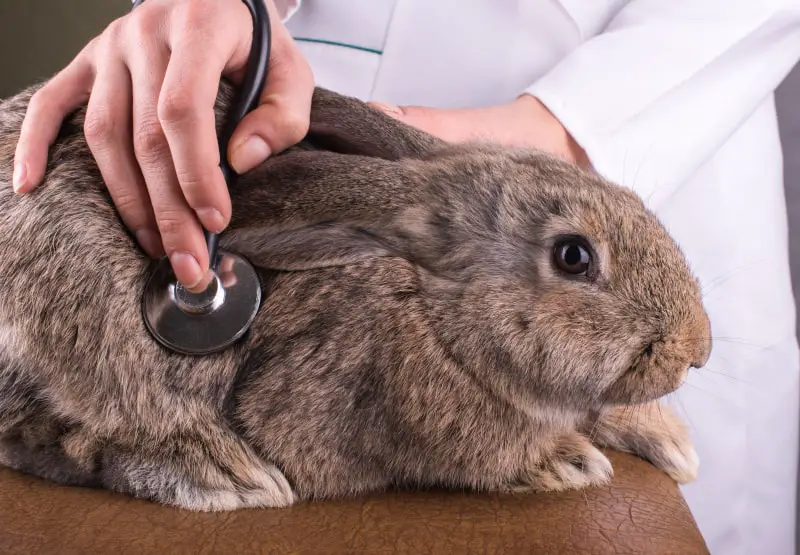The truth is that pet rabbits are fragile creatures and as a good owner you should familiarize yourself with the reasons why pet rabbits die. They are more susceptible to disease than their wild counterparts, however there are many factors that affect a pet rabbit’s life span. As the old adage goes forewarned is forearmed. Here we will deal with the diseases and various other circumstances that may be fatal to pet rabbits.
What diseases are fatal to pet rabbits?
There are diseases that hit the pet rabbit community particularly hard and often result in fatalities. Here we will explore some of the more deadly threats. The good news is that list of particularly deadly diseases that have an almost 100% mortality rate is relatively small.
- Rabbit hemorrhagic disease (RHD) – This disease also goes by the name of rabbit calicivirus disease (RCD) or the viral hemorrhagic disease (VHD). It usually affects the European Rabbit or the Coney as they refer to them in some regions. It is also usually fatal and is highly contagious. Only adult rabbits are affected by this virus So that is good news if you have young pet rabbits. Usually, infected bunnies will run a high fever. You may be able to detect it by simply holding your rabbit. He or she may feel unusually warm. The poor creatures may squeal due to their obvious discomfort. Sadly the last stage of this disease is a coma and then your pet rabbit may die in about three days. Once you rabbit contracts this disease, there is no effective treatment available to combat it. The good news is that vaccination is available and an annual booster is an excellent safeguard against this deadly disease.
- Myxomatosis – This is a deadly disease that can affect pet rabbits. It is transmitted via the myxoma virus, which fleas and mosquitos usually carry around. The disease can crop up anywhere in the world, so it is not localized to any particular area. The first sign of Myxomatosis is first exhibited by the eyes. Your bunny may develop conjunctivitis that is accompanied by a white milky discharge. Your pet rabbit’s eyes may tear up quite a bit. As the disease progresses, swelling starts to crop up around the eyes, nose mouth and genitals. The disease compromises the rabbits breathing and often the rabbit slips into a coma before death. Rabbits do not recover from Myxomatosis. The best way to prevent this deadly disease from creeping into your home is to eliminate fleas and mosquitos from your bunny’s living area. You can do this by clearing containers that collect water to prevent mosquitos reproducing on your property. Also, if you have other pets, make sure that you keep on top of their flea treatments. Since once the fleas enter your home, they can hop onto your bunny. You can also spray for both mosquitoes and fleas. However, you need to move your bunnies until the chemical airs out. Pet rabbits are sensitive to chemicals and it is better to remove them to prevent accidental poisoning.


- Uterine Cancer – Cancer is usually a very daunting word for pet owners. Unfortunately, Uterine adenocarcinoma is a pretty common cancer in female rabbits. It occurs in 60% of does over the age of three. If your bunny has uterine cancer, there is also a high possibility that she may develop mammary cancer as well. You may be able to catch this disease in time if you are observant. If you notice blood in her urine or unusual vaginal discharge, you should take her to the veterinarian right away. Uterine cancers often cause bleeding and this is the symptom that may eventually cause the death of your rabbit.
- Renal Failure – Pet rabbits are similar to us, in that they too are susceptible to renal failure. Just as it is sometimes fatal in humans, it can also take your pet rabbit’s life. Acute renal failure sometimes strikes suddenly and there may be very little that you can do. With renal failure, your bunnies are unable to effectively remove waste and excess water from their blood. As usual, knowing the signs to look out for may make the difference between life and death. There are quite a few symptoms, so a list may be more helpful
- No appetite
- Depression
- Diarrhea
- Seizures
- Constipation
- Heart Issues
- Fever
- Kidney pain
Renal failure can be caused by blood infections, extreme stress, strokes, heart failure or a urinary tract obstruction. Your veterinarian will suggest treatment like adjusting your pet rabbit’s diet and hydration. However, if renal failure is severe, your rabbit may die. Dialysis and kidney transplants are not an option for pet rabbits yet.
What are some the causes of sudden death in pet rabbits?
There are certain circumstances that may be harmful to your pet rabbit that you may not be aware of. Here, we will demystify the topic, so that you can be prepared. Here are some of the issues that can arise.
- Fly Strike – This deadly condition occurs when flies lay eggs on your pet rabbit. These eggs hatch and the maggots burrow in the pet rabbit’s flesh and begins to feed at an alarming rate. The maggots will literally eat your bunny from the inside! It is ever bit as frightening as it sounds. The maggots also release harmful toxins that slowly begins to poison your rabbit’s body.
- A fly infestation usually occurs when your rabbit cage and in turn your rabbit gets dirty and has feces stuck to its fur, hind legs, and bottom. If your pet rabbit’s fur is soaked in urine or any other liquid, flies are sure to come. The unpleasant odor surely does not help. Warmth added to the equation makes the ideal environment for flies.
- If your pet rabbit has a maggot infestation, he or she may have a seizure and/or may appear listless. If you catch the infestation early, you may be able to remove the maggots manually with a tweezer. In fact, this is recommended instead of using any kind of chemical to treat the infestation. Bunnies are very sensitive to chemicals and most pesticides are toxic to their delicate systems.The best way to protect your bunny from flies is by paying particular attention to cleanliness. You should clean your cages often. If you have indoor bunnies, you could install screens to keep flies out.
- Sudden Temperature changes – Pet rabbits, especially ones that you have acquired from the pet shop, are used to being in ideal temperatures. It is advised that when the weather is cold, they should be kept indoors exclusively. Low temperatures can send pet rabbits into shock.
- Heart Attacks brought on by fear – Scared to death, is a very real possibility for a pet rabbit. Loud noises like fireworks, shouting and animal noises may give your pet rabbit a heart attack. It is not a common occurrence, but it is definitely a possibility.
- Pet Attacks -As unpleasant as it might be, your pets may not get along. Even though having different types of pets brings its unique type of joy, effectively managing their interaction could be a challenge. Aggressive dogs and cats may attack and kill your pet rabbit. Rabbits do not stand a chance against vicious cats and dogs. Hunting dogs are a specific threat since it is in their nature to hunt. Bunnies are an irresistible temptation. The best way to prevent attacks on your bunny is to have a designated area for them that your dogs and cats cannot breach.
- Mishandling by Children – Young children should not be allowed to handle bunnies. They often can’t follow the instructions regarding the proper handling of pet rabbits. Your bunny may squirm in an attempt to get away from grasping fingers. They may sustain broken bones or go into shock from loud noises from children. Your pet rabbit may not survive such an episode.
- Poisoning – This unfortunate situation can happen if your bunnies are outdoors. Sometimes, a pet owner may use weedicides in his or her garden. Unfortunately, your pet rabbit may nibble on grass that was sprayed with the chemical and this may result in death.
- Unsuccessful Pregnancies – If your pet rabbit miscarries further along in her pregnancy, tragedy may strike. Often, the baby rabbit dies inside the mother, harmful toxins are released into her system. Sepsis sets in.

- Swallowing sharp objects – Your pet rabbit likes to dig and explore when he or she is outside. Unfortunately, they may swallow an object that they should not. If the object is sharp like a shard of glass this may cause internal bleeding that unfortunately may result in a fatality.
Even though, it is not the most pleasant topic to discuss. The reality is you have chosen a fragile creature as a buddy. Every pet owner should be aware of the diseases and other factors that could prove life-threatening to bunnies. The good news is that most of the deadly issues are preventable and hopefully, your pet rabbits have long healthy years ahead of them.

